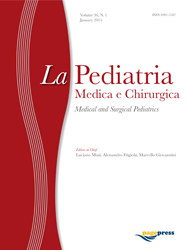Reviews
Vol. 39 No. 4 (2017)
Nutritional management of preterm newborn after hospital discharge: energy and nutrients

Publisher's note
All claims expressed in this article are solely those of the authors and do not necessarily represent those of their affiliated organizations, or those of the publisher, the editors and the reviewers. Any product that may be evaluated in this article or claim that may be made by its manufacturer is not guaranteed or endorsed by the publisher.
All claims expressed in this article are solely those of the authors and do not necessarily represent those of their affiliated organizations, or those of the publisher, the editors and the reviewers. Any product that may be evaluated in this article or claim that may be made by its manufacturer is not guaranteed or endorsed by the publisher.
Received: 15 December 2017
Accepted: 15 December 2017
Accepted: 15 December 2017
4386
Views
2035
Downloads
721
HTML






